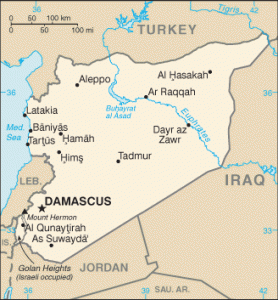World powers agreed on a plan for a political transition in Syria in a meeting in Geneva on Saturday called by UN envoy Kofi Annan. A unity government will be formed according to a democratic process and can include members of the present regime as well as opposition.
 Asked about the fate of Syrian President Bashar al-Assad, who has committed atrocities throughout the brewing civil war, Annan said he doubted Syrians would “select people with blood on their hands” to lead them.
Asked about the fate of Syrian President Bashar al-Assad, who has committed atrocities throughout the brewing civil war, Annan said he doubted Syrians would “select people with blood on their hands” to lead them.
“The document makes it clear that we have provided guidelines and principles to assist the Syrian parties as they move ahead with the transition and establish a transition governmentand go through changes required,” he added. The future of Assad “will be left to them.
Stipulating that the democratic transition can be supervised as free and fair, the question becomes: what kind of options do Syrians really have to choose from? There is very little in the way of organized alternatives to Assad and his regime.
Another issue is what was missing from the new Annan plan: a demand for outside powers to quit aiding either side in Syria. Foreign meddling on behalf of all sides has been instrumental in prolonging the conflict by emboldening both sides and making a political settlement more remote.
Indeed, a legitimate political transition would be impossible to realize with Russia continuing to prop up the Assad regime and with the US and its allies continuing to aid the rebel militias in a bid to “[pursue] regime change by civil war in Syria,” as Joshua Landis of the Center for Middle East Studies at the University of Oklahoma has described it.
James Dobbins, director of the RAND International Security and Defense Policy Center and a former US assistant secretary of state told NPR recently, “the external environment in which sides are providing arms to both of the contending parties—all of that suggests that the situation’s going to continue to deteriorate.”


